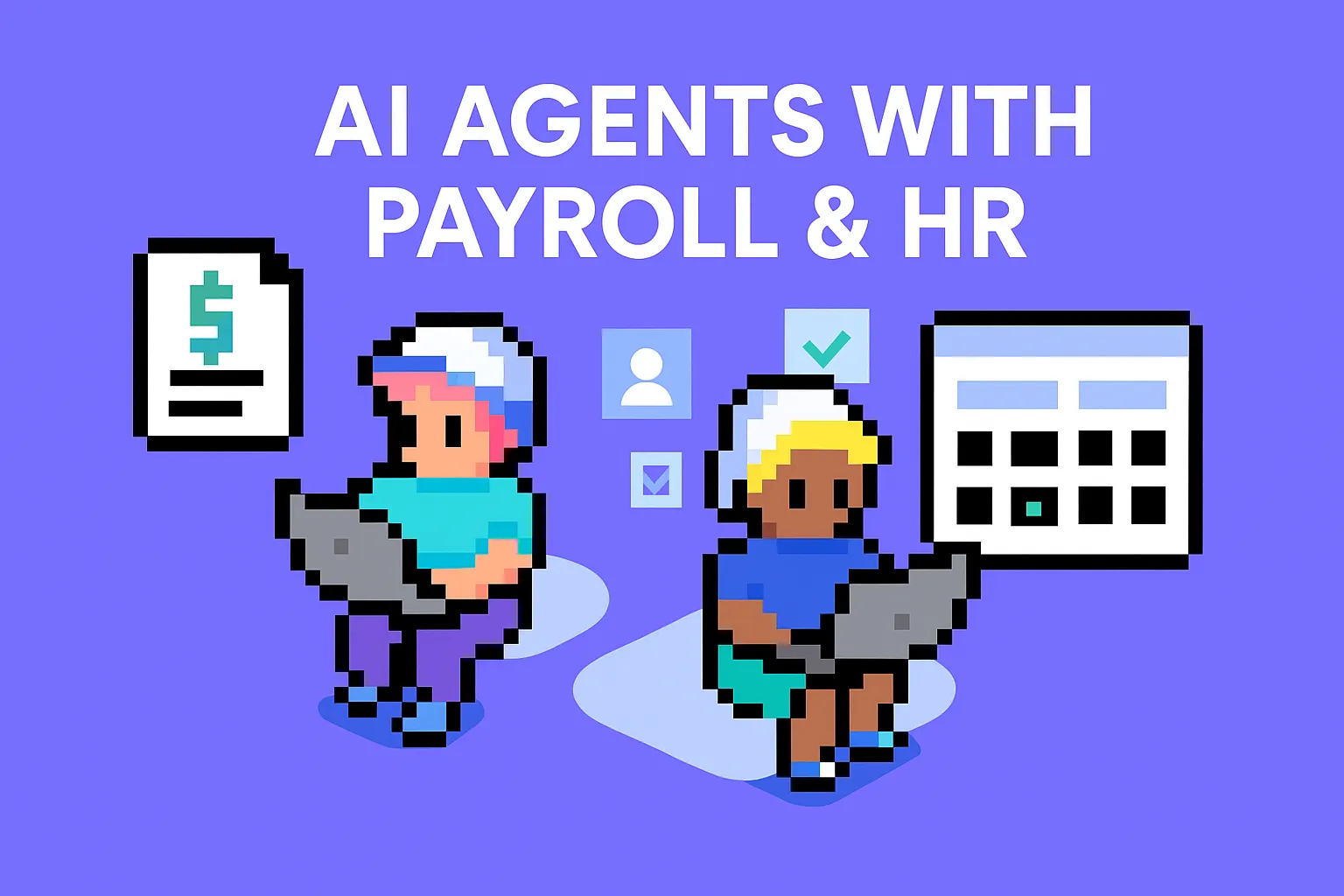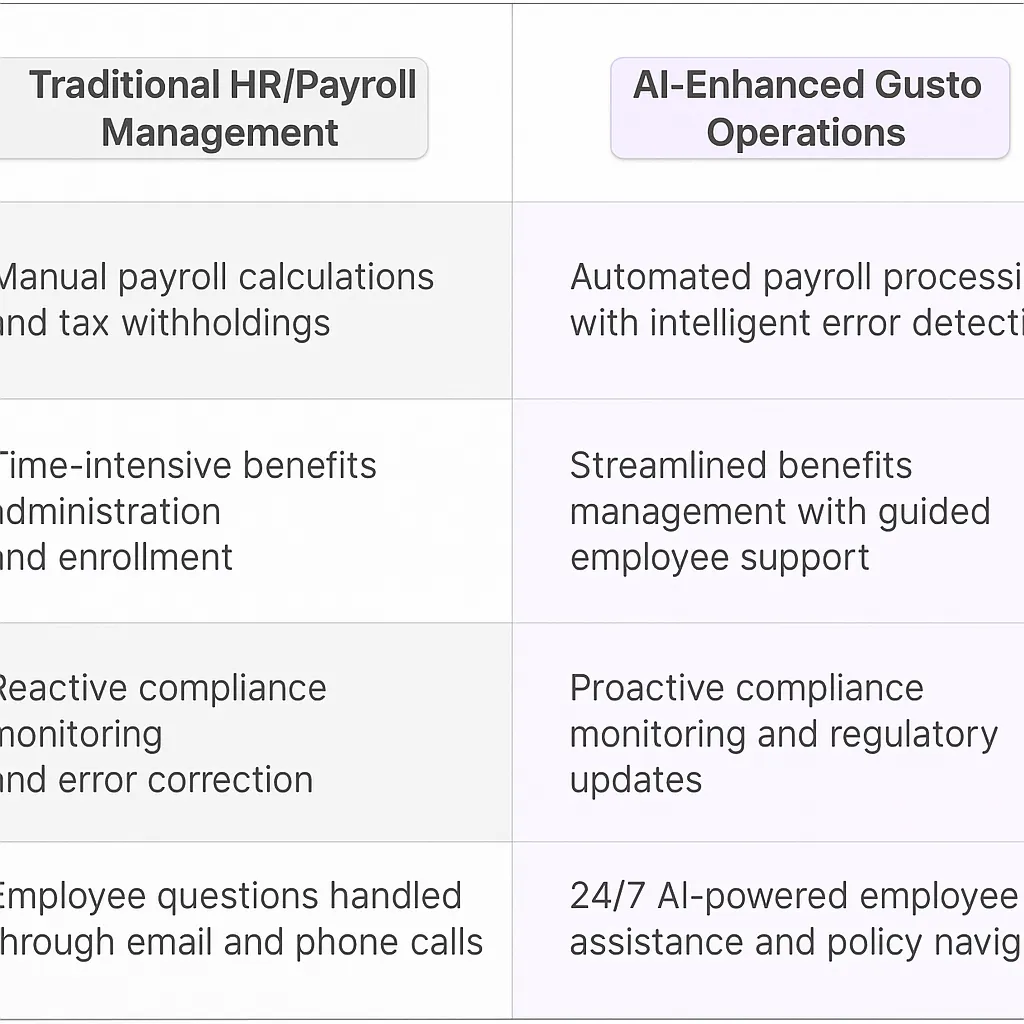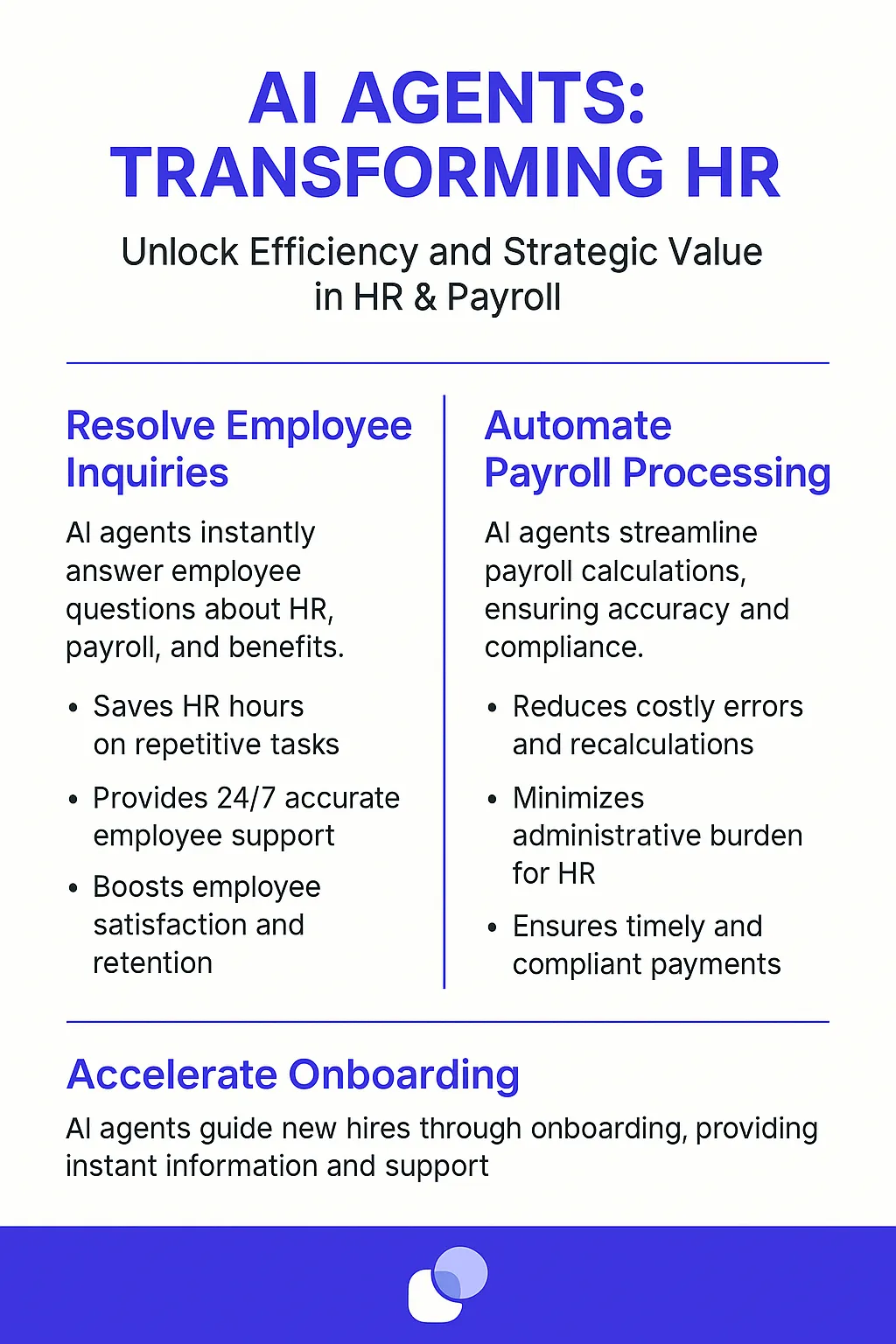Gusto
Understanding Gusto's Platform and Core Capabilities
What is Gusto?
Gusto stands as a comprehensive payroll, benefits, and HR platform designed for modern businesses. The platform combines sophisticated payroll processing with intuitive HR tools, handling everything from employee onboarding to tax compliance. By integrating AI Agents, Gusto has evolved beyond traditional payroll software into an intelligent system that adapts to each organization's unique needs.
Key Features of Gusto
- Full-service payroll processing with automated tax calculations
- Employee benefits administration including health insurance and 401(k)
- Time tracking and attendance management
- Hiring and onboarding tools
- Compliance monitoring and reporting
- Integration capabilities with accounting and time-tracking software

Benefits of AI Agents for Gusto
What would have been used before AI Agents?
Before AI Agents, payroll and HR teams spent countless hours manually responding to employee questions about benefits, PTO policies, and payroll calculations. They relied on static FAQ documents, lengthy email threads, and repetitive one-on-one conversations to address common inquiries. The traditional approach created bottlenecks, delayed response times, and pulled HR professionals away from strategic work.
What are the benefits of AI Agents?
AI Agents transform how businesses handle payroll and HR operations through Gusto in several key ways:
- 24/7 Policy Navigation: Digital teammates field employee questions about benefits, PTO, and company policies at any hour, providing accurate information from your company handbook and Gusto documentation.
- Payroll Calculation Support: The AI analyzes complex payroll calculations, explains tax withholdings, and helps employees understand their pay stubs - reducing confusion and support tickets.
- Onboarding Acceleration: New hires receive guided support through their documentation and setup process, with AI Agents explaining each step and form requirement clearly.
- Benefits Education: Rather than overwhelming employees during open enrollment, AI Agents break down benefits options, compare plans, and explain terminology in plain language.
- Compliance Monitoring: The AI stays current with changing regulations and flags potential compliance issues before they become problems, protecting both employers and employees.
The network effects are clear - as more companies adopt AI Agents in their Gusto workflows, the knowledge base expands and the responses become increasingly nuanced. This creates a compounding advantage where each interaction makes the system more valuable for all users.

Potential Use Cases of AI Agents with Gusto
Processes
Payroll processing becomes significantly more efficient when AI agents handle the complex calculations and compliance requirements. The digital teammates can automatically calculate overtime pay, handle multiple pay rates, and ensure accurate tax withholdings across different states.
Benefits administration transforms from a manual, error-prone process into a smooth operation. AI agents can track eligibility dates, process enrollment changes, and manage documentation for health insurance, 401(k), and other benefit programs.
Time tracking and attendance management gain precision through AI-powered oversight. The system can flag unusual patterns, reconcile timesheet discrepancies, and maintain compliance with labor laws specific to each jurisdiction.
Tasks
New employee onboarding becomes systematic and thorough when AI agents manage the documentation flow. They can generate offer letters, initiate background checks, and ensure all required forms are completed accurately and on time.
Tax filing and compliance management reach new levels of accuracy. AI agents monitor regulatory changes across jurisdictions, apply updates to calculations, and maintain proper documentation for audits.
Expense management transforms through intelligent processing. AI agents can categorize expenses, verify receipt documentation, and flag potential policy violations before reimbursement processing.
Leave management operates smoothly as AI agents track various types of time off, calculate accruals, and ensure compliance with state and federal regulations. They can automatically process requests, update payroll accordingly, and maintain accurate records.
Performance review coordination becomes more structured and data-driven. AI agents can gather feedback from multiple sources, compile performance metrics, and generate comprehensive review documents while ensuring consistency across departments.
Advanced Applications
Workforce analytics reach sophisticated levels when AI agents process vast amounts of HR data. They can identify trends in employee retention, analyze compensation patterns, and provide insights for strategic workforce planning.
Compensation planning evolves with AI agents analyzing market data, internal equity, and performance metrics to suggest appropriate salary adjustments and bonus distributions.
Benefits optimization becomes more strategic as AI agents analyze utilization patterns, costs, and employee feedback to recommend adjustments to benefits packages that maximize value for both the organization and employees.

Industry Use Cases
AI agents integrated with Gusto unlock powerful new capabilities for businesses managing payroll, benefits, and HR operations. The impact spans from small businesses to large enterprises, with each implementation solving distinct operational challenges. These digital teammates handle complex payroll calculations, benefits administration, and time-tracking tasks that traditionally consumed hours of manual work.
What makes Gusto's AI integration particularly compelling is how it adapts to different business models and industry requirements. A restaurant chain uses it differently than a tech startup, yet both extract immense value. The agents learn from each organization's specific needs - whether it's managing seasonal workforce fluctuations or navigating multi-state tax compliance.
The real breakthrough comes from how these AI agents evolve alongside your business operations. They don't just execute tasks - they identify patterns, flag potential issues before they become problems, and suggest process improvements based on your company's unique data. This creates a continuous optimization loop that gets smarter with each payroll cycle and HR interaction.
Looking at specific industry applications reveals how this technology transforms core business operations while maintaining the human elements essential to good HR practices.
Hospitality Industry: AI-Powered Payroll Management That Actually Works
Restaurant operators face a unique challenge when managing payroll - the complex dance of tracking regular wages, overtime, and tips across multiple shifts and service categories. The traditional process involves managers spending 5-10 hours per week manually reviewing timesheets, calculating tip distributions, and double-checking compliance.
Gusto's AI agent transforms this time-intensive process into a 30-minute weekly task. The digital teammate learns the specific compensation rules for each role - from hosts to bartenders to kitchen staff - and automatically flags potential errors like missed breaks or overtime thresholds.
For tip calculations, the AI analyzes historical patterns and current sales data to validate tip reports and distribution fairness. It can even detect potential tip credit violations or minimum wage shortfalls before they become compliance issues.
A multi-location restaurant group in Chicago implemented Gusto's AI agent and discovered it caught $37,000 in potential overtime violations in the first quarter. The system identified employees approaching overtime thresholds and alerted managers to adjust schedules proactively.
Beyond pure efficiency gains, the AI's ability to spot patterns leads to better business decisions. Managers gain insights into which shifts have optimal labor costs and how seasonal changes impact staffing needs. The data helps restaurants maintain profitability while ensuring employees are paid accurately and on time.
The hospitality industry runs on razor-thin margins where every hour of management time counts. Gusto's AI agent gives restaurant operators the tools to turn payroll from a burden into a strategic advantage.
Technology Startups: Scaling Payroll Without Scaling Headcount
Growth-stage startups face a critical inflection point when their headcount doubles or triples within months. The payroll complexity increases exponentially - especially with remote workers across multiple states, varying equity compensation packages, and complex bonus structures. Most finance teams get buried under spreadsheets trying to manage it all.
Gusto's AI agent brings order to this chaos by learning each startup's unique compensation philosophy and applying it consistently across the organization. The digital teammate handles the intricate calculations for RSU vesting schedules, commission structures, and multi-state tax withholdings that would typically require a full-time compensation analyst.
A Series B SaaS company with 150 employees found their finance team was spending 20+ hours per month reconciling commission payments with sales data. After implementing Gusto's AI agent, the system automatically matched closed deals to commission tiers and flagged only the edge cases needing human review - reducing the workload to 2 hours monthly.
The AI's pattern recognition capabilities also surface valuable insights about compensation trends. It can identify wage disparities across departments, forecast cash requirements for upcoming equity vestings, and benchmark compensation packages against industry standards.
One of the most valuable features for fast-growing tech companies is the AI's ability to automate new hire payroll setup. The system learns from historical data to suggest appropriate tax withholdings, benefit deductions, and equity allocations based on role and location - reducing setup time from hours to minutes.
For startups racing to hit aggressive growth targets, every hour spent on administrative tasks is an hour not spent on strategy. Gusto's AI agent transforms payroll from a scaling bottleneck into a competitive advantage in the war for talent.
Considerations for Gusto AI Implementation
Implementing AI agents within Gusto's payroll and HR ecosystem requires careful planning and strategic consideration. The complexity of payroll data, combined with strict compliance requirements, creates unique implementation challenges that organizations must address.
Technical Considerations
Data integration poses the first major hurdle. Gusto's systems contain sensitive employee information, tax records, and complex payroll calculations. AI agents need robust data handling capabilities to process this information while maintaining accuracy and security. Organizations must establish clear data governance frameworks and ensure their AI systems can handle multiple data formats from various sources.
API limitations and system dependencies also impact implementation. Gusto's API architecture may restrict certain automated actions, requiring organizations to build custom middleware solutions or adjust their automation expectations.
Operational Considerations
Employee training becomes critical when introducing AI agents into payroll workflows. HR teams need to understand how to interact with these digital teammates effectively, especially when handling exceptions or unusual payroll scenarios. Creating comprehensive documentation and establishing clear escalation paths helps maintain operational stability.
Compliance monitoring requires constant attention. AI agents must operate within strict regulatory frameworks, including state-specific payroll rules and federal tax requirements. Organizations need to implement robust audit trails and regular compliance checks to ensure their AI systems maintain regulatory alignment.
Change Management Challenges
Resistance to automation in payroll processes often emerges from concerns about job security and accuracy. HR teams may worry about losing control over critical payroll functions. Developing a clear communication strategy and demonstrating the value of AI in reducing errors and freeing up time for strategic work helps address these concerns.
Setting realistic expectations about AI capabilities prevents implementation disappointment. While AI agents can handle routine tasks effectively, they may struggle with complex edge cases or unusual situations that require human judgment.
The integration of AI agents with Gusto also requires ongoing employee training to ensure teams can leverage the technology effectively while maintaining compliance standards.
AI-Driven Evolution in Workforce Management
The integration of AI Agents with Gusto represents a fundamental shift in how organizations manage their workforce operations. These digital teammates don't just automate tasks - they create a new operational paradigm where HR professionals can focus on strategic initiatives while maintaining precise control over critical processes. The network effects generated by widespread adoption continue to enhance the system's capabilities, making it increasingly valuable for organizations of all sizes. As AI technology evolves, we'll likely see even more sophisticated applications that further transform the payroll and HR landscape.
Looking ahead, the evolution of AI-powered workforce operations will likely include predictive analytics for workforce planning, automated compliance updates, and even more sophisticated integration with business intelligence systems. This transformation represents not just technological advancement, but a fundamental reimagining of how organizations can optimize their human capital management strategies.













